演讲
演讲稿优秀范文大全【十篇】
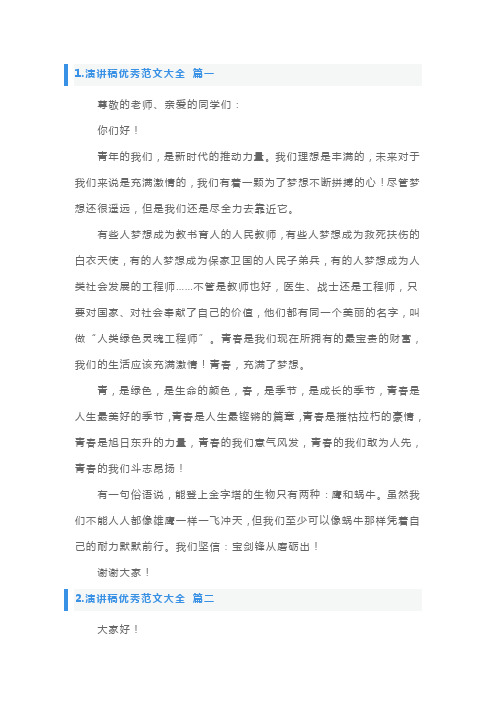
1.演讲稿优秀范文大全篇一尊敬的老师、亲爱的同学们:你们好!青年的我们,是新时代的推动力量。
我们理想是丰满的,未来对于我们来说是充满激情的,我们有着一颗为了梦想不断拼搏的心!尽管梦想还很遥远,但是我们还是尽全力去靠近它。
有些人梦想成为教书育人的人民教师,有些人梦想成为救死扶伤的白衣天使,有的人梦想成为保家卫国的人民子弟兵,有的人梦想成为人类社会发展的工程师……不管是教师也好,医生、战士还是工程师,只要对国家、对社会奉献了自己的价值,他们都有同一个美丽的名字,叫做“人类绿色灵魂工程师”。
青春是我们现在所拥有的最宝贵的财富,我们的生活应该充满激情!青春,充满了梦想。
青,是绿色,是生命的颜色,春,是季节,是成长的季节,青春是人生最美好的季节,青春是人生最铿锵的篇章,青春是摧枯拉朽的豪情,青春是旭日东升的力量,青春的我们意气风发,青春的我们敢为人先,青春的我们斗志昂扬!有一句俗语说,能登上金字塔的生物只有两种:鹰和蜗牛。
虽然我们不能人人都像雄鹰一样一飞冲天,但我们至少可以像蜗牛那样凭着自己的耐力默默前行。
我们坚信:宝剑锋从磨砺出!谢谢大家!2.演讲稿优秀范文大全篇二大家好!面对一条河流,岁月如斯,背后的小树早已婆娑一片树林,无人会注意柳林后还会有聆听杜鹃溪水的身影。
暮然回首,成长的脚步深深浅浅,却都给我留下了永恒的快乐。
成长的滋味到底是什么呢?这是一个不的答案。
在成长的过程中我体会到了,也品味到了。
成长中,我们不断地触碰着新鲜的事。
童年时,在父母爱的港湾里游玩,迈进图书室里,我又被一篇篇文章所吸引,从中读了陆游的悲,李白的狂,但我仍在吟诵,仍在想,像在午夜微醒时聆听窗外随风而来的铃声,又像在月牙高升时观赏闲适万种的睡莲。
这读书中的快乐,又岂是这只言片语所描绘?也许有人会问,你的成长就都是快乐吗?有没有烦恼,有没有失败?当然有,不过,在我看来,失败挫折犹如一枝青橄榄,初尝酸涩,细品甘甜,人们常说,沧桑是一种美,都是历尽沧桑才能体味真正的人生,这挫折和失败就是人们在生活中摸爬滚打留下的创伤与皱纹吗?记得有位哲人说过:“人活着就要犯点错误,犯错误就是长见识。
五分钟演讲稿【精选五篇】
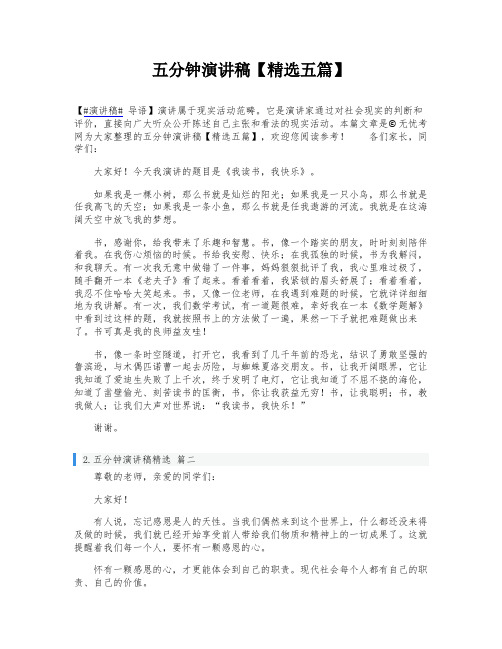
五分钟演讲稿【精选五篇】【#演讲稿# 导语】演讲属于现实活动范畴。
它是演讲家通过对社会现实的判断和评价,直接向广大听众公开陈述自己主张和看法的现实活动。
本篇文章是©无忧考网为大家整理的五分钟演讲稿【精选五篇】,欢迎您阅读参考!各们家长,同学们:大家好!今天我演讲的题目是《我读书,我快乐》。
如果我是一棵小树,那么书就是灿烂的阳光;如果我是一只小鸟,那么书就是任我高飞的天空;如果我是一条小鱼,那么书就是任我遨游的河流。
我就是在这海阔天空中放飞我的梦想。
书,感谢你,给我带来了乐趣和智慧。
书,像一个踏实的朋友,时时刻刻陪伴着我。
在我伤心烦恼的时候。
书给我安慰、快乐;在我孤独的时候,书为我解闷,和我聊天。
有一次我无意中做错了一件事,妈妈狠狠批评了我,我心里难过极了,随手翻开一本《老夫子》看了起来。
看着看着,我紧锁的眉头舒展了;看着看着,我忍不住哈哈大笑起来。
书,又像一位老师,在我遇到难题的时候,它就详详细细地为我讲解。
有一次,我们数学考试,有一道题很难,幸好我在一本《数学题解》中看到过这样的题,我就按照书上的方法做了一遍,果然一下子就把难题做出来了。
书可真是我的良师益友哇!书,像一条时空隧道,打开它,我看到了几千年前的恐龙,结识了勇敢坚强的鲁滨逊,与木偶匹诺曹一起去历险,与蜘蛛夏洛交朋友。
书,让我开阔眼界,它让我知道了爱迪生失败了上千次,终于发明了电灯,它让我知道了不屈不挠的海伦,知道了凿壁偷光、刻苦读书的匡衡,书,你让我获益无穷!书,让我聪明;书,教我做人;让我们大声对世界说:“我读书,我快乐!”谢谢。
2.五分钟演讲稿精选篇二尊敬的老师,亲爱的同学们:大家好!有人说,忘记感恩是人的天性。
当我们偶然来到这个世界上,什么都还没来得及做的时候,我们就已经开始享受前人带给我们物质和精神上的一切成果了。
这就提醒着我们每一个人,要怀有一颗感恩的心。
怀有一颗感恩的心,才更能体会到自己的职责。
现代社会每个人都有自己的职责、自己的价值。
演讲稿范文大全10篇
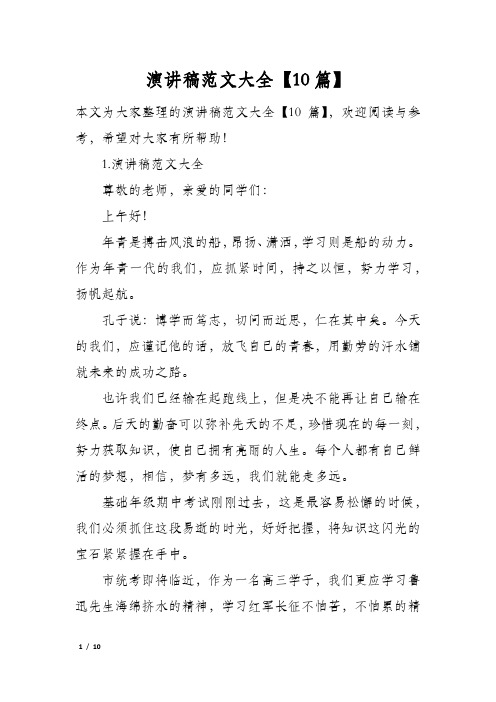
演讲稿范文大全【10篇】本文为大家整理的演讲稿范文大全【10篇】,欢迎阅读与参考,希望对大家有所帮助!1.演讲稿范文大全尊敬的老师,亲爱的同学们:上午好!年青是搏击风浪的船,昂扬、潇洒,学习则是船的动力。
作为年青一代的我们,应抓紧时间,持之以恒,努力学习,扬帆起航。
孔子说:博学而笃志,切问而近思,仁在其中矣。
今天的我们,应谨记他的话,放飞自己的青春,用勤劳的汗水铺就未来的成功之路。
也许我们已经输在起跑线上,但是决不能再让自己输在终点。
后天的勤奋可以弥补先天的不足,珍惜现在的每一刻,努力获取知识,使自己拥有亮丽的人生。
每个人都有自己鲜活的梦想,相信,梦有多远,我们就能走多远。
基础年级期中考试刚刚过去,这是最容易松懈的时候,我们必须抓住这段易逝的时光,好好把握,将知识这闪光的宝石紧紧握在手中。
市统考即将临近,作为一名高三学子,我们更应学习鲁迅先生海绵挤水的精神,学习红军长征不怕苦,不怕累的精神,加倍努力,在接下来的一段时间里,进行扎实有效的复习,争取取得市统考的全面丰收,为以后的学习奠定良好的基础,为明年的高考建立我们应有的自信。
同学们,让我们一起努力吧!让我们用热情拥抱未来,用青春谱写人生,用行动证明存在的价值吧!谢谢大家!2.演讲稿范文大全尊敬的老师,亲爱的同学们:大家好!胜利贵在坚持,要取得胜利就要坚持不懈地努力,饱尝了许多次的失败之后才能成功,即所谓的失败乃成功之母,成功也就是胜利的标志,也可以这样说,坚持就是胜利。
古往今来,许许多多的名人不都是依靠坚持而取得胜利的吗?荀子说:“骐骥一跃,不能十步,驽马十驾,功在不舍。
”这也正充分地说明了坚持的重要性,骏马虽然比较强壮,腿力比较强健,然而它只跳一下,最多也不能超过十步,这就是不坚持所造成的后果;相反,一匹劣马虽然不如骏马强壮,然而若它能坚持不懈地拉车走十天,照样也能走得很远,它的成功在于走个不停,也就是坚持不懈,这也就像似龟兔赛跑:兔子腿长跑起来比乌龟快得多,照理说,也应该是兔子赢得这场比赛,然而结果恰恰相反,乌龟却赢了这场比赛,这是什么缘故呢?这正是因为兔子不坚持到底,它恃自己腿长,跑得快,跑了一会儿就在路边睡大觉,似乎是稳操胜券,然而乌龟则不同了,他没有因为自己的腿短,爬得慢而气馁,反而,它却更加锲而不舍地坚持爬到底。
三分钟吸引人的即兴演讲【5篇】

三分钟吸引人的即兴演讲【5篇】【#演讲稿# 导语】演讲要讲求寓教于乐。
同文章或杂志相比,人们期望在演讲中感受到你的激情,而不是枯燥无味的背诵。
本篇文章是©无忧考网整理的三分钟吸引人的即兴演讲【5篇】,欢迎阅读!亲爱的老师、同学们:大家好!古人说:“书中自有黄金屋”。
每当我读一本新书,获一份知识的时候,我心中的那种快乐是无法用语言表达的,知识是人类进步的阶梯。
一个教师,要想能够适应新的教育形势,就必须读书加以补足,况且,在竞争激烈的现代社会,没有一个渊博的大脑是不行的。
读书让我们能够很好的乘上时代的风帆,才能够让自己的职业生辉。
每天读上五小时书,人很快就会渊博起来。
我们的教师每天很多时间都用在教育教学中,或许不可能这样的投入,但是只要书籍在我的心中,我每天抽出一点点的时间,我就可以补足自己的不够,因为知识是来不得半点虚假,更不能是道听途说。
我们可以从教育理论书籍中获得理论的指导,为我们的教育教学指引方向;我们可以从名家名著中或者精神的营养,为我们的自身素质的提高获得高品味的营养;我们可以从众多的书籍中找到人生的意义,生命的诠释,心灵的感动。
一句谚语这样说:“生活中没有书,就好像天地间没有阳光;智慧中没有书,就仿佛鸟儿没有翅膀”。
中华民族自古以来是以礼仪大邦闻名于世,我们的民族从来就有知书达礼的传统美德。
“虚席以待”、“程门立雪”、“三顾茅庐”等等以礼相待的成语和典故,在历广为传诵,就深刻反映了这一点。
读书才能知礼,讲礼,对人彬彬有礼,对他人的尊重,是保持人们正常关系的准则。
知礼讲礼的人大多以他人为重,以社会为重。
能真诚待人正是一个人高尚情操的表现,是内在优秀品质的外化。
读书是提高个人修养的必然途径,是提高自身素质的重要手段之一。
千里之行,始于足下,让我们坚信自己的信念不会改变,让我们在读书中感受人生的哲理。
谢谢大家!2.三分钟吸引人的即兴演讲篇二尊敬的老师们、亲爱的同学们:大家好!记得朱自清有这样一句话:燕子去了,有再来的时候;杨柳枯了,有再青的时候;桃花谢了,有再开的时候。
即兴演讲大全【12篇】
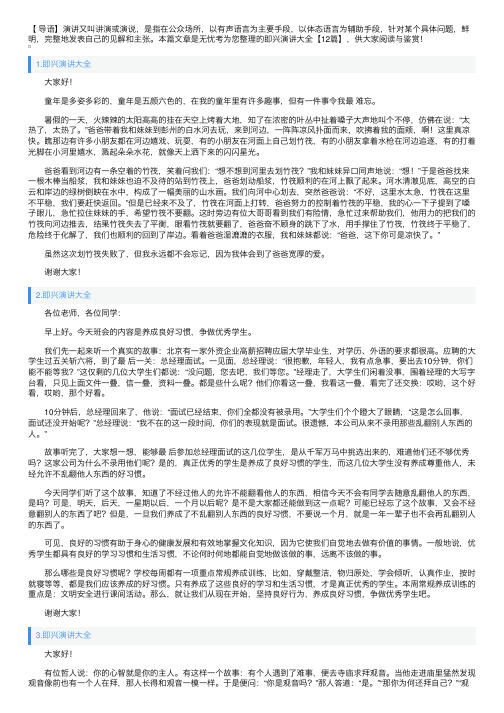
【导语】演讲⼜叫讲演或演说,是指在公众场所,以有声语⾔为主要⼿段,以体态语⾔为辅助⼿段,针对某个具体问题,鲜明,完整地发表⾃⼰的见解和主张。
本篇⽂章是⽆忧考为您整理的即兴演讲⼤全【12篇】,供⼤家阅读与鉴赏!1.即兴演讲⼤全 ⼤家好! 童年是多姿多彩的,童年是五颜六⾊的,在我的童年⾥有许多趣事,但有⼀件事令我最难忘。
暑假的⼀天,⽕辣辣的太阳⾼⾼的挂在天空上烤着⼤地,知了在浓密的叶丛中扯着嗓⼦⼤声地叫个不停,仿佛在说:“太热了,太热了。
”爸爸带着我和妹妹到彭州的⽩⽔河去玩,来到河边,⼀阵阵凉风扑⾯⽽来,吹拂着我的⾯颊,啊!这⾥真凉快。
瞧那边有许多⼩朋友都在河边嬉戏、玩耍,有的⼩朋友在河⾯上⾃⼰划⽵筏,有的⼩朋友拿着⽔枪在河边追逐,有的打着光脚在⼩河⾥嬉⽔,溅起朵朵⽔花,就像天上洒下来的闪闪星光。
爸爸看到河边有⼀条空着的⽵筏,笑着问我们:“想不想到河⾥去划⽵筏?”我和妹妹异⼝同声地说:“想!”于是爸爸找来⼀根⽊棒当船浆,我和妹妹也迫不及待的站到⽵筏上,爸爸划动船浆,⽵筏顺利的在河上飘了起来。
河⽔清澈见底,⾼空的⽩云和岸边的绿树倒映在⽔中,构成了⼀幅美丽的⼭⽔画。
我们向河中⼼划去,突然爸爸说:“不好,这⾥⽔太急,⽵筏在这⾥不平稳,我们要赶快返回。
”但是已经来不及了,⽵筏在河⾯上打转,爸爸努⼒的控制着⽵筏的平稳,我的⼼⼀下⼦提到了嗓⼦眼⼉,急忙拉住妹妹的⼿,希望⽵筏不要翻。
这时旁边有位⼤哥哥看到我们有险情,急忙过来帮助我们,他⽤⼒的把我们的⽵筏向河边推去,结果⽵筏失去了平衡,眼看⽵筏就要翻了,爸爸奋不顾⾝的跳下了⽔,⽤⼿撑住了⽵筏,⽵筏终于平稳了,危险终于化解了,我们也顺利的回到了岸边。
看着爸爸湿漉漉的⾐服,我和妹妹都说:“爸爸,这下你可是凉快了。
” 虽然这次划⽵筏失败了,但我永远都不会忘记,因为我体会到了爸爸宽厚的爱。
谢谢⼤家!2.即兴演讲⼤全 各位⽼师,各位同学: 早上好。
今天班会的内容是养成良好习惯,争做优秀学⽣。
演讲稿范文10篇
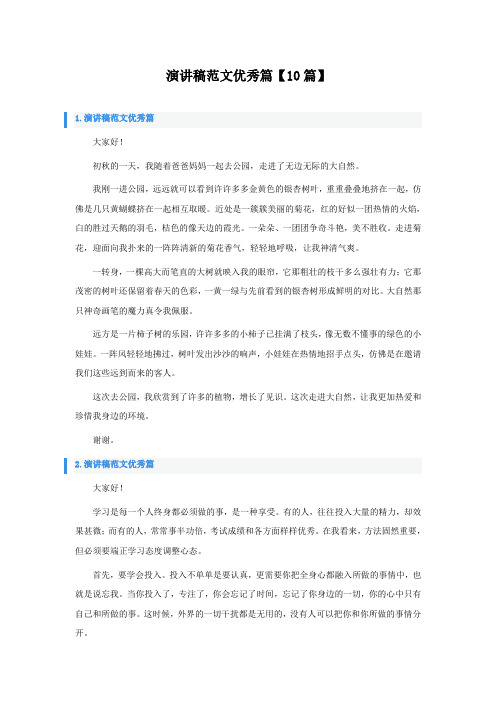
演讲稿范文优秀篇【10篇】1.演讲稿范文优秀篇大家好!初秋的一天,我随着爸爸妈妈一起去公园,走进了无边无际的大自然。
我刚一进公园,远远就可以看到许许多多金黄色的银杏树叶,重重叠叠地挤在一起,仿佛是几只黄蝴蝶挤在一起相互取暖。
近处是一簇簇美丽的菊花,红的好似一团热情的火焰,白的胜过天鹅的羽毛,桔色的像天边的霞光。
一朵朵、一团团争奇斗艳,美不胜收。
走进菊花,迎面向我扑来的一阵阵清新的菊花香气,轻轻地呼吸,让我神清气爽。
一转身,一棵高大而笔直的大树就映入我的眼帘,它那粗壮的枝干多么强壮有力;它那茂密的树叶还保留着春天的色彩,一黄一绿与先前看到的银杏树形成鲜明的对比。
大自然那只神奇画笔的魔力真令我佩服。
远方是一片柿子树的乐园,许许多多的小柿子已挂满了枝头,像无数不懂事的绿色的小娃娃。
一阵风轻轻地拂过,树叶发出沙沙的响声,小娃娃在热情地招手点头,仿佛是在邀请我们这些远到而来的客人。
这次去公园,我欣赏到了许多的植物,增长了见识。
这次走进大自然,让我更加热爱和珍惜我身边的环境。
谢谢。
2.演讲稿范文优秀篇大家好!学习是每一个人终身都必须做的事,是一种享受。
有的人,往往投入大量的精力,却效果甚微;而有的人,常常事半功倍,考试成绩和各方面样样优秀。
在我看来,方法固然重要,但必须要端正学习态度调整心态。
首先,要学会投入。
投入不单单是要认真,更需要你把全身心都融入所做的事情中,也就是说忘我。
当你投入了,专注了,你会忘记了时间,忘记了你身边的一切,你的心中只有自己和所做的事。
这时候,外界的一切干扰都是无用的,没有人可以把你和你所做的事情分开。
其次,要拥有安定的心态。
你要学会沉稳。
不要心急,不要慌张。
要时不时停下来思考一下,冷静一下。
再者,要学会调整自己。
调整的不仅仅是学习的目标、方法,更重要的是心态。
总之,只要你用心对待,相信自己,适当的注意学习的方法,保持良好的复习心态,从容地面对压力,你就一定会超越自己,在人生的道路上,建立自己成功的金字塔!谢谢。
演讲稿(共10篇)
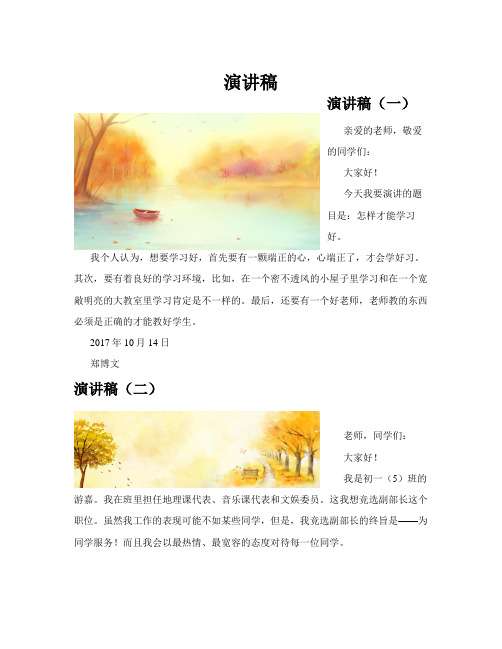
演讲稿演讲稿(一)亲爱的老师,敬爱的同学们:大家好!今天我要演讲的题目是:怎样才能学习好。
我个人认为,想要学习好,首先要有一颗端正的心,心端正了,才会学好习。
其次,要有着良好的学习环境,比如,在一个密不透风的小屋子里学习和在一个宽敞明亮的大教室里学习肯定是不一样的。
最后,还要有一个好老师,老师教的东西必须是正确的才能教好学生。
2017年10月14日郑博文演讲稿(二)老师,同学们:大家好!我是初一(5)班的游嘉。
我在班里担任地理课代表、音乐课代表和文娱委员。
这我想竞选副部长这个职位。
虽然我工作的表现可能不如某些同学,但是,我竞选副部长的终旨是——为同学服务!而且我会以最热情、最宽容的态度对待每一位同学。
如果我当上了副部长,我会以同学们为中心,无条件的为同学们服务,尽可能的给予每位同学最大的帮助。
我会尽自己所能,给同学们一个好的环境学习、生活我还会尽量的化解同学与同学之间的误会、矛盾与冲突;如果实在不行,我会以最迅速的速度以最准确的语言传达有用的信息交给老师,让老师来处理。
俗话说得好:“没有最好,只有更好!”我坚信:我今后在老师的帮助,同学们的配合下,会做得更好谢谢大家!中大附中三水实验学校初一:游嘉演讲稿(三)各位同学、老师:大家好!我本人对英语有着浓厚的兴趣,我十分想成为英语课代表,一来是为大家服务,二来是能够以次促进我更加努力的学习英语,我希望大家能够给我这个机会,这不仅仅是对我的考验,也是对我的信任。
我认为当英语课代表,首先就要在英语上给同学们起模范作用,我会在以后的生活里努力学习英语,如果大家有什么不会的问题随时可以来问我,我会很热心的帮你们解答。
而且我也会认真完成老师给我的任务,帮助老师,帮我们班集体的英语成绩带动起来。
当然我也是第一次当了,如果我当上了这个课代表,我一定会好好学习,好好工作,严于律己,以身作则,同时我也希望大家能够监督我的工作,如果有什么做的不对的地方,请大家指出,我会接受大家善意的批评,不会辜负大家对我的期望和信任,谢谢!一年级:李慧敏演讲稿(四)敬爱的老师亲爱的同学们:大家好!我今天要演讲的主题是《祖国在我心中》。
演讲稿优秀8篇

演讲稿优秀8篇演讲稿篇一我是20某某年的第一批新员工,也是深蓝公司第一个项目的第一个销售经理,所以说我的第一比较多啊。
感谢公司闫总、孙总对我的照顾。
闫总是我的领路人,讲到师承关系,孙总是我的启蒙老师。
深蓝公司能走的更远,其实这中间的这种师承关系是很重要的,因为在深蓝有很多新员工,来了以后你们的第一件事有可能是拜师,当然这个拜师没有拜师仪式,但是这个拜师是在传承一些老式的优良传统的和深蓝的'优良作风。
进入深蓝以来,我做过的项目很多,深蓝公司给予我的也很多,是用语言无法形容的,从进入深蓝是一个什么都不懂,进入深蓝之前所从事的行业和房地产关联性也很小。
今天是年终总结会,之前我给很多兄弟讲过一件事,入这个行呢是从发宣传单页,很辛苦。
从一个新员工到一个老员工注定要有一个过程,因为深蓝给予我的是无法形容的,也是无法表达的。
我只想给在座的不管是新员工还是老员工说:“深蓝是一个值得一试的平台,在这个平台里能走多远,发展到一个什么程度,需要一个字——悟,”深蓝能不能给大家提供一个好的平台,我们拭目以待;你能不能在深蓝这个公司发挥好、演好、走好自己的路,要看自己的努力。
最后,希望各位能在深蓝公司越走越好,谢谢大家。
励志演讲稿篇二岁月流转,心情也在花开花落间起伏,春天年复一年交替轮回,却总能如约而至。
阳光斜斜地铺出温暖的感觉,小草也悄悄地钻出了土地。
一切对于我们来说是那么地熟悉,却还是会带给我们一些新的喜悦,一份新的感受。
张开双臂,拥抱着春天里的风,再深呼吸,嗅着春的气息,也捕捉着春天里的小小愿望和新的一年中的大大希望。
关于新年许下的愿望,我们的实践过程总是这样:用整整一年的时间,实现部分决心,做许多计划外的事情,最后在新的一年即将开始的时候坚信,这一刻的自己,比一年前的自己变得更好。
所以,新年愿望的意义在于,当12个月终于过去,我们会再度满怀希望地相信,不如意的一切都将过去,新的一年将是阳光普照的365天。
- 1、下载文档前请自行甄别文档内容的完整性,平台不提供额外的编辑、内容补充、找答案等附加服务。
- 2、"仅部分预览"的文档,不可在线预览部分如存在完整性等问题,可反馈申请退款(可完整预览的文档不适用该条件!)。
- 3、如文档侵犯您的权益,请联系客服反馈,我们会尽快为您处理(人工客服工作时间:9:00-18:30)。
Our Way of Life Makes Us MiserableBy Erich FrommlievMost Americans live a consumption-happy, fun-loving, jet-traveling life. Contrary to happiness, I believe that the present way of life leads to increasing anxiety, helplessness and, eventually, to the disintegration of our culture.The rates of alcohnolism, suicide and divorce, as well as gang rule, acts of violence are growing up with the material progress in the last decades. So, I believe the best way of life is to be a person who is much, not the one who has much or uses much. Since the goal of life is the full unfolding of a person's potentialities, I determined to be a creative, hard-working person whose aim is not money or other kind of material security but the peace of spirit and the value to other people. I try to be one of the humanist thinkers who can see the alternatives clearly and realize that the choice is still ours. Wish everyone could enjoy life and be oneself regardless of time.It may be argued that all these pathological phenomena exist because we hav e not yet reached our aim, that of an affluent society. It is true, we are still far from being an affluent society. But the material progress made in the last decades allows us to hope that our system might eventually produce a materially affluent society. Yet will we be happier then? The example of Sweden, one of the most prosperous, democratic and peaceful European countries, is not very encouraging: Sweden, as is often pointed out, in spite of all its material security has among the highest alcoholism and suicide rates in Europe, while a much poorer country like Ireland ranks among the lowest in these respects. Could it be that our dream that material welfare per se leads to happiness is just a pipe dream?. . .Certainly the humanist thinkers of the eighteenth and nineteenth centuries, who are our ideological ancestors, thought that the goal of life was the full unfolding of a person's potentialities; what mattered to them was the person who is much, not the one who has much or uses much. For them economic production was a means to the unfolding of man, not an end. It seems that today the means have become ends, that not only "God is dead", as Nietzsche said in the nineteenth century, but also man is dead; that what is alive are the organizations, the machines, and that man has become their slave rather than being their master.Each society creates its own type of personality by its way of bringing up children in the family, by its system of education, by its effective values(that is, those values that are rewarded rather than only preached). Every society creates the type of "social character" which is needed for its proper functioning. It forms men who want to do what they have to do. What kind of men does our large-scale, bureaucratized industrialism need?It needs men who cooperate smoothly in large groups, who want to consume more and more, and whose tastes are standardized and can be easily influenced and anticipated. It needs men who feel free and independent, yet who are willing to be commanded, to do what is expected, to fit into the social machine without friction, men who can be guided without force, led without leaders, prompted without an aim except the aim to be on the move, to function, to go ahead.Modern industrialism has succeeded in producing this kind of man. He is the "alienate d" man. He is alienated in the sense that his actions and his own forces have become estrange d from him; they stand above him and against him, and rule him rather than being ruled by him. His life forces have been transformed into things and institutions, and these things and institutions have become idol s. They are something apart from him, which he worships and to which he submit s. Alienated man bows down before the works of his own hands. He experiences himself not as the active bearer of his own forces and riches but as an impoverish ed "thing", dependent on other things outside of himself. He is the prisoner of the very economic and political circumstances which he has created.Since our economic organization is based on continuous and ever-increasing consumption (think of the threat to our economy if people did not buy a new car until their old one was really obsolete), contemporary industrial man is encouraged to be consumption-crazy. Without any real enjoyment, he "takes in" drink, food, cigarettes, sights, lectures, books, movies, television, any new kind of gadget. The world has become one great maternal breast, and man has become the eternal suckling, forever expectant, forever disappointed.In general, our society is becoming one of giant enterprise s directed by a bureaucracy in which man becomes a small, well-oiled cog in the machinery. The oiling is done with higher wages, fringe benefits, well-ventilate d factories and piped music, and by psychologists and "human relations" experts; yet all this oiling does not alter the fact that man has become powerless, that he does not wholeheartedly participate in his work and that he is bored with it. In fact, the blue-and the white-collar workers have become economic puppets who dance to the tune of automate d machines and bureaucratic management.The worker and employee are anxious, not only because they might find themselves out of a job (and with installment payments due); they are anxious also because they are unable to acquire any real satisfaction or interest in life. They live and die without ever having confronted the fundamental realities of human existence as emotionally and intellectually productive, authentic and independent human beings.Those higher up on the social ladder are no less anxious. Their lives are no less empty than those of their subordinate s. They are even more insecure in some respects. They are in a highly competitive race. To be promoted or to fall behind is not only a matter of salary but even more a matter ofself-esteem. When they apply for their first job, they are tested for intelligence as well as for the right mixture of submissiveness and independence. From that moment on they are tested again and again — by the psychologists, for whom testing is a big business, and by their superiors, who judge their behavior, sociability, capacity to get along, etc. , their own and that of their wives. This constant need to prove that one is as good as or better than one's fellow-competitor creates constant anxiety and stress, the very causes of unhappiness and psychosomatic illness.The "organization man" may be well fed, well amused and well oiled, yet he lacks a sense of identity because none of his feelings or his thoughts originate s within himself; none is authentic. He has no convictions, either in politics, religion, philosophy or in love. He is attracted by the "latest model" in thought, art and style, and lives under the illusion that the thoughts and feelings which he has acquired by listening to the media of mass communication are his own.He has a nostalgic longing for a life of individualism, initiative and justice, a longing that he satisfies by looking at Western s. But these values have disappeared from real life in the world of giant corporations, giant state and military bureaucracies and giant labor unions. He, the individual, feels so small before these giants that he sees only one way to escape the sense of utter insignificance: He identifies himself with the giants and idolizes them as the true representatives of his own human powers, those of which he has dispossessed himself. His effort to escape his anxiety takes other forms as well. His pleasure in a well-filled freezer may be one unconscious way of reassuring himself. His passion for consumption — from television to sex — is still another symptom, a mechanism which psychiatrists often find in anxious patients who go on an eating or buying spree to evade their problems.The man whose life is centered around producing, selling and consuming commodities transforms himself into a commodity. He becomesincreasingly attracted to that which is man-made and mechanical, rather than to that which is natural and organic. Many men today are more interested in sports cars than in women; or they experience women as a car which one can cause to race by pushing the right button. Altogether they expect happiness is a matter of finding the right button, not the result of a productive, rich life, a life which requires making an effort and taking risks. In their search for the button, some go to the psychoanalyst, some go to church and some read "self-help" books. But while it is impossible to find the button for happiness, the majority are satisfied with pushing the buttons of cameras, radios, television sets, and watching science fiction becoming reality.One of the strangest aspects of this mechanical approach to life is the widespread lack of concern about the danger of total destruction by nuclear weapons; a possibility people are consciously aware of. The explanation, I believe, is that they are more proud of than frightened by the gadgets of mass destruction. Also, they are so frightened of the possibility of their personal failure and humiliation that their anxiety about personal matters prevents them from feeling anxiety about the possibility that everybody and everything may be destroyed. Perhaps total destruction is even more attractive than total insecurity and never ending personal anxiety.Am I suggesting that modern man is doomed and that we should return to the preindustrial mode of production or to nineteenth century "free enterprise" capitalism? Certainly not. Problems are never solved by returning to a stage which one has already outgrown. I suggest transforming our social system from a bureaucratically managed industrialism in which maximal production and consumption are ends in themselves (in the Soviet Union as well as in the capitalist countries) into a humanist industrialism in which man and the full development of his potentialities — those of love and of reason — are the aims of all social arrangements. Production and consumption should serve only as means to this end, and should be prevented from ruling man.To attain this goal we need to create a Renaissance of Enlightenment and of Humanism. It must be an Enlightenment, however, more radically realistic and critical than that of the seventeenth and eighteenth centuries. It must be a Humanism that aims at the full development of the total man, not the gadget man, not the consumer man, not the organization man. The aim of a humanist society is the man who loves life, who has faith in life, who is productive and independent. Such a transformation is possible if we recognize that our present way of life makes us sterile and eventually destroys the vitality necessary for survival.Whether such transformation is likely is another matter. But we will not be able to succeed unless we see the alternatives clearly and realize that the choice is still ours. Dissatisfaction with our way of life is the first step toward changing it. As to these changes, one thing is certain: They must take place in all spheres simultaneously — in the economic, the social, the political and the spiritual. Change in only one sphere will lead into blind alley s, as did the purely political French Revolution and the purely economic Russian Revolution. Man is a product of circumstances — but the circumstances are also his product. He has a unique capacity that differentiate s him from all other living beings: the capacity to be aware of himself and of his circumstances, and hence to plan and to act according to his awareness.。
